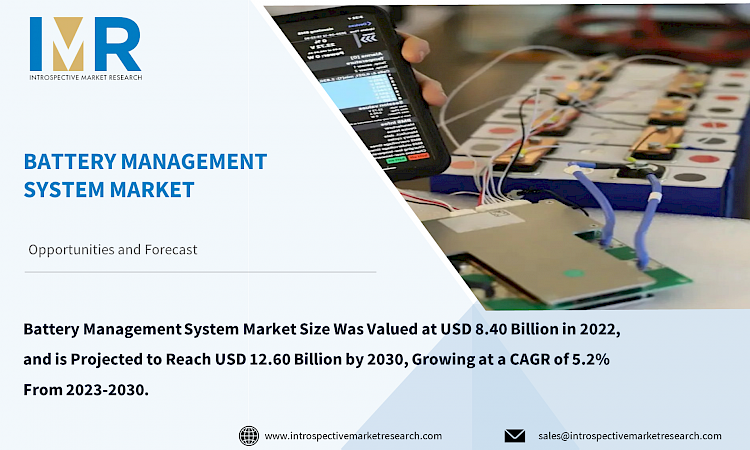Market Overview:
Battery Management System Market Size Was Valued at USD 8.40 Billion in 2022, and is Projected to Reach USD 12.60 Billion by 2030, Growing at a CAGR of 5.2% From 2023-2030.
The basic task of a Battery Management System (BMS) is to ensure that optimum use is made of the energy inside the battery powering the portable product and that the risk of damage inflicted upon the battery is minimized. This is achieved by monitoring and controlling the battery’s charging and discharging process.
Battery management focuses on ensuring that batteries in portable devices are used efficiently. This includes handling tasks like charging the battery properly and safeguarding it against misuse. Power management involves regulating power distribution throughout the system and minimizing power consumption by individual components. This can involve making hardware and software adjustments to reduce energy usage, such as lowering clock speeds or turning off unused parts of the system.
Energy management aims to maximize the efficiency of energy conversions within a system and manage energy storage effectively. For instance, techniques like zero-voltage and zero-current switching can be applied to reduce energy losses in systems like Switched-Mode Power Supplies, improving overall energy transfer efficiency from the main power source to the battery.
Top Key Players Covered in The Battery Management System Market:
- Storage Battery Systems LLC (United States)
- Elithion Inc. (United States)
- Cummins Inc. (United States)
- Navitas Systems (United States)
- Valence Technology, Inc. (United States)
- Texas Instruments (United States)
- Analog Devices, Inc. (United States), and Other Major Players
Market Dynamics and Factors:
The integration of renewable energy sources like solar and wind power has led to a sporadic energy generation pattern, which often doesn't align with peak energy demand periods. This mismatch creates a demand for energy storage solutions to store excess energy generated during off-peak times and supply it during peak demand periods. Consequently, the battery management system market is witnessing a surge in demand as it plays a crucial role in managing and optimizing the performance of batteries used in energy storage systems.
The growing adoption of renewable energy sources, maintaining grid stability and reliability becomes paramount. Renewable energy systems are inherently variable due to factors like weather conditions, making grid management more challenging. Battery management systems help in stabilizing the grid by providing frequency regulation, voltage support, and peak shaving capabilities. As a result, the market for battery management systems is experiencing significant growth as utilities and grid operators seek reliable solutions to integrate renewable energy sources seamlessly into the grid. The increasing adoption of electric vehicles (EVs) worldwide is driving significant growth opportunities for the battery management system (BMS) market. As consumers and governments prioritize sustainability and reduce carbon emissions, the demand for electric vehicles continues to rise. This surge in EV adoption necessitates efficient battery management systems to monitor and control the performance of batteries, ensuring optimal safety, reliability, and longevity of EV powertrains.
Electric vehicles rely entirely on battery packs for their power source, making battery performance a critical factor in EV functionality and user experience. Battery management systems play a crucial role in optimizing battery performance by managing factors such as charging and discharging rates, temperature control, and cell balancing. As consumers seek longer driving ranges, faster charging times, and increased reliability from their EVs, the demand for advanced battery management systems that can deliver these benefits continues to grow.
The Battery Management System Market Report Highlight:
- By Type, the motive battery segment is expected to dominate, the motive battery segment's dominance in the Battery Management System (BMS) market can be attributed to its wide array of applications across various industries. Motive batteries are commonly used in electric vehicles (EVs), forklifts, and other mobility solutions, which are experiencing rapid growth due to increasing environmental concerns and governmental regulations favouring clean energy.
- By Battery Type, Lithium-ion (Li-ion) segment Li-ion batteries have gained widespread adoption across various industries due to their high energy density, long cycle life, and lightweight nature, making them an ideal choice for portable electronics, electric vehicles (EVs), and renewable energy storage systems. As a result, the demand for efficient BMS solutions to manage and optimize the performance of Li-ion batteries has surged.
- By Region, Asia Pacific is Expected to Dominate the Market the Asia Pacific region's dominance in the Battery Management System (BMS) market can be attributed to several factors, particularly its role as a manufacturing hub for electric vehicles (EVs). Nations like China, Japan, and South Korea are at the forefront of EV production, significantly contributing to the demand for traction batteries. These countries host major automotive manufacturers that have invested heavily in the development and production of electric vehicles, creating a robust ecosystem for traction battery manufacturing.
Key Industry Development:
- In November 2023, Contemporary Amperex Technology Co., Limited (CATL), a global leader in advanced battery technologies, announced the successful acquisition of Nidec Motor Corporation's automotive motor unit. This strategic move is poised to enhance CATL's capabilities in the Battery Management System (BMS) market, leveraging Nidec's expertise in BMS development and reinforcing CATL's commitment to driving innovation in electrification.
- In August 2023, Cummins Inc., a global leader in power solutions, and Delta Electronics, a pioneering force in advanced electronics, proudly announced their strategic partnership aimed at revolutionizing the hybrid and electric vehicle industry. With a shared commitment to innovation and sustainability, this collaboration seeks to deliver cutting-edge powertrain solutions incorporating state-of-the-art Battery Management System (BMS) technology.
The Battery Management System Market Segmentation:
By Type
- Motive Battery
- Stationary Battery
By Battery Type
- Lithium-ion
- Lead-acid
- Nickel-based
- Solid-state
- Flow battery
By Topology
- Centralized
- Distributed
- Modular
By Application
- Automotive
- Industrial
- Renewable Energy
- Telecommunications
- Military and Defense
For this report, Introspective Market Research has segmented the Battery Management System Market based on region:
Regional Outlook (Revenue in USD Million; Volume in Units, 2023-2030)
North America
- The U.S.
- Canada
- Mexico
Eastern Europe
- Russia
- Bulgaria
- The Czech Republic
- Hungary
- Poland
- Romania
- Rest of Eastern Europe
Western Europe
- Germany
- UK
- France
- Netherlands
- Italy
- Spain
- Rest of Western Europe
Asia Pacific
- China
- India
- Japan
- Singapore
- Australia
- New-Zealand
- Rest of APAC
Middle East & Africa
- Turkey
- Saudi Arabia
- Qatar
- UAE
- Israel
- South Africa
South America
- Brazil
- Argentina
- Rest of SA





